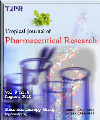
|
Tropical Journal of Pharmaceutical Research
Pharmacotherapy Group, Faculty of Pharmacy, University of Benin, Benin City, Nigeria
ISSN: 1596-5996
EISSN: 1596-5996
Vol. 14, No. 7, 2015, pp. 1161-1166
|
 Bioline Code: pr15152
Bioline Code: pr15152
Full paper language: English
Document type: Research Article
Document available free of charge
|
|
|
Tropical Journal of Pharmaceutical Research, Vol. 14, No. 7, 2015, pp. 1161-1166
| en |
Effect of Nutrient Formulations on Permeation of Proteins and Lipids through Porcine Intestine In vitro
Tonglairoum, Prasopchai & Opanasopit, Praneet
Abstract
Purpose: To investigate the effect of nutrient formulations on the permeation of proteins and lipids
through porcine intestine in vitro.
Method: In vitro permeation studies of proteins and lipids of two peptide-based formulations, composed
of various compounds and sources of hydrolyzed protein was carried out, and compared with a
conservative polymeric formulation as control, The test was undertaken using Franz diffusion cell
apparatus incorporating porcine intestine.
Results: The peptide-based formulation demonstrated higher protein absorption than the conservative
polymeric one. However, there were some differences in protein absorption rates between the peptidebased
formulations obtained from various sources. Formulation A with 1.0 and 1.5 kcal/mL exhibited
significantly (p < 0.05) higher cumulative protein permeation (11.97 ± 0.23 and 12.54 ± 0.94 μg/cm2)
than formulations B (9.41 ± 0.36 and 9.67 ± 0.35 μg/cm2) and C (8.34 ± 0.56 and 8.61 ± 0.71 μg/cm2),
respectively. Lipid permeation from formulations A and B (13.91 ± 0.26 and 12.94 ± 0.59 μg/cm2
respectively for 1.0 kcal/mL formulation, and 13.31 ± 0.21 and 12.86 ± 0.16 for 1.5 kcal/mL formulation)
which consist mainly of medium chain triglycerides (MCTs), were significantly (p < 0.05) higher than
those from formulation C (11.49 ± 0.43 and 12.62 ± 0.38 μg/cm2 for 1.0 and 1.5 kcal/mL formulation,
respectively) which mostly contained long chain triglycerides (LCTs).
Conclusion: The results reveal that oligomeric formulations have higher absorption rate than polymeric
formulations. However, the outcomes when administered to clinically ill patients need to be investigated.
Keywords
Nutrient formulations; Permeation; Proteins; Lipids; Porcine intestine; Medium chain triglycerides; long chain triglycerides
|
| |
© Copyright 2015 - Tropical Journal of Pharmaceutical Research
Alternative site location: http://www.tjpr.org
|
|
